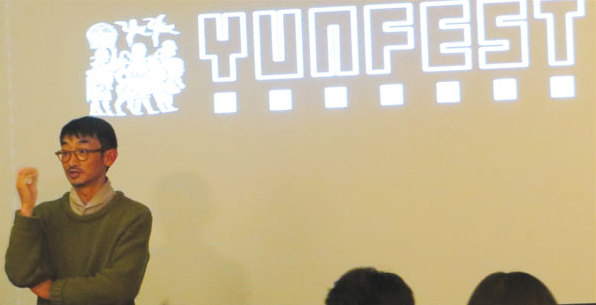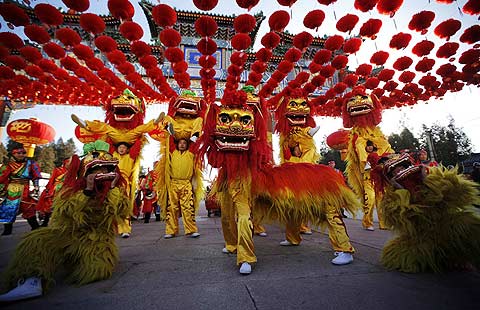Docu film-making is growing in China
Updated: 2013-11-30 07:37
By Caroline Berg in New York (China Daily USA)
|
||||||||
It was a quiet meeting, as if it were clandestine.
In a classroom-like setting in Brooklyn, New York, three central figures from the Chinese independent film scene discussed documentary filmmaking and exhibition in contemporary China to a largely young Chinese audience.
Independent film festivals have ridden a rocky road in China. Organizers can never be too sure if local authorities will literally pull the plug on the power, like they did at the opening ceremony of the 2012 Beijing Independent Film Festival. Many times these festivals, which feature many documentary films, have to go underground.
|
Sicheng Yi, director of the Yunnan Multi-Culture Visual Festival (Yunfest) in Kunming, talks about documentary filmmaking in China at a presentation in New York on Monday. Caroline Berg / China Daily |
"I've been seeing a phenomenon around here," said Sicheng Yi, director of the Yunnan Multi-Culture Visual Festival (Yunfest). "The audience tends to use China's independent documentary films as a sort of reference material to talk about China issues."
Yi and two Chinese documentary filmmakers - Feng Cong and Chenyu Mao - are on tour with Benny Shaffer, a PhD candidate in Media Anthropology at Harvard University. Shaffer and Xin Zhou, a cinema studies student at New York University, co-curated a presentation at Brooklyn's UnionDocs Center for Documentary Art on Monday night, where the filmmakers exhibited and spoke about their work. In addition to New York, the filmmakers have also visited the University of Michigan, Harvard and the University of Chicago.
"I first found out about Yunfest in 2008 while I was an undergrad doing some research on visual anthropology and independent cinema," Shaffer said. "It was really through [Yi] and going through the Yunfest film archive that I learned about the cinema scene in China and became very interested in it."
Sicheng Yi, director of the Yunnan Multi-Culture Visual Festival (Yunfest), introduced the history of the festival and spoke on the broader significance in the Chinese documentary scene. His presentation was followed by excerpt showings and discussions led by filmmakers Feng Cong and Chenyu Mao.
Yi hails from Kunming, the capital of the southwestern Yunnan province, and is a scholar and curator of Chinese independent cinema. He is editor of Today, Or The Golden Age (Jintian, Huo Huangjin Shidai, 2011), an anthology of critical writings on Chinese independent cinema by filmmakers and scholars from China, Europe and North America.
"My guideline for [Yunfest] is I want to change the discourse of discussing and seeing Chinese independent documentary film," Yi said. "China's independent documentary film movement is one of the most competitive and original film creations that's taking place in contemporary China."
The biennial Yunfest was started in 2003 by a group of digital documentarians and visual anthropologists from Yunnan University, and has become one of the most prominent platforms for independent nonfiction cinema in China. Films in the six festivals have included 99 that deal with the topic of transformations in China's countryside and villages, 83 that portray people on the fringe of society, 41 that deal with Chinese traditions and customs, and 67 that deal with city life.
Cong showed an excerpt of a film of his that demonstrates current issues in urban spaces in China, such as widespread demolition.
"This phenomenon that space is ever changing has become normal to us," the Beijing-based independent filmmaker and poet said about his motivation for creating his most recent work, Stratum 1: The Visitors (2013).
Cong's film won top prize at the 2013 Beijing Independent Film Festival, and his works have appeared at the Berlin International Film Festival, Yamagata International Documentary Film Festival, International Film Festival Rotterdam, and across the independent film festival circuit in China. Cong is also on the editorial board of the online film journal Film Auteur (Dianying Zuozhe), which publishes critical writings by independent filmmakers in China.
For Mao, the countryside is his film fodder, and the inspiration behind Paddy Films, which he founded in 2003.
"I chose the name 'Paddy Films' because most of my film works of the past few years have been devoted to the depiction of the mind and soul of ricegrowing areas," Mao wrote about his production company for Yunfest, where he had a retrospective of his work. "Paddy Films pays respect to endogenous cultural systems by restoring them to their original state and writing of the small details that compose the social order of their everyday life."
In addition to being an independent filmmaker, Mao is a rice farmer in his native Hunan province. He established the Second Text Laboratory in 2006, which creates a space for representing the diversity of China's ethnic groups and the unheard voices of China's ethnic groups and history.
At the moment, Beijingbased filmmakers dominate the field, according to Yunfest's records. However, numbers and interest to make films are evident all across China.
The audience is strong, too. Since 2003, Yunfest attendance has increased steadily and significantly. The festival has attracted 49,000 independent film fans curious to discover what stories are being told about China's vast and varied landscape.
carolineberg@chinadailyusa.com
(China Daily USA 11/30/2013 page11)

 In teen star transition, Bieber may want to emulate Miley
In teen star transition, Bieber may want to emulate Miley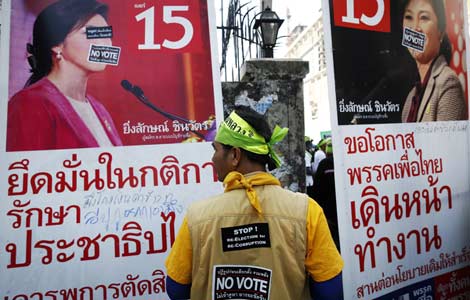
 Thai caretaker PM urges protesters not to block voting
Thai caretaker PM urges protesters not to block voting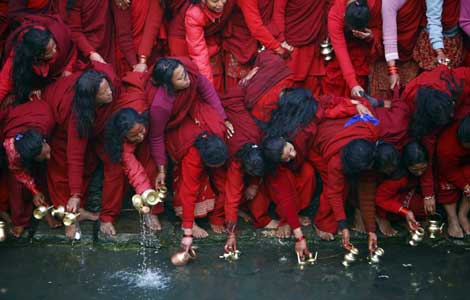
 Holy waters in Nepal
Holy waters in Nepal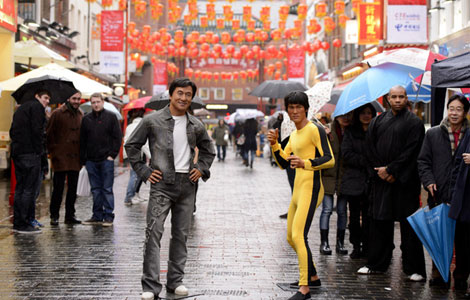
 Kongfu stars wax shine in London ChinaTown
Kongfu stars wax shine in London ChinaTown
 Obama pushes minimum wage hike
Obama pushes minimum wage hike
 Getting ready for some football
Getting ready for some football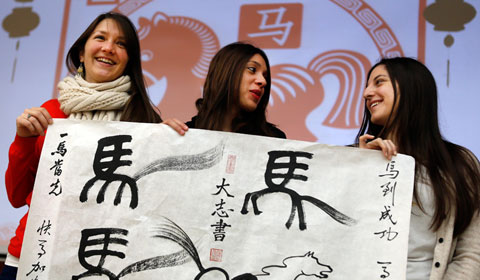
 The Year of Horse gallops in
The Year of Horse gallops in
 Musical celebration of Fab Four anniversary
Musical celebration of Fab Four anniversary
Most Viewed
Editor's Picks

|

|

|

|

|

|
Today's Top News
Obama speech on NSA welcome
Tape of King speech found
Norovirus blamed for cruise sickness
Largest Chinese Internet IPO yet
US experts divided over China's local debts
Xi extends Lunar New Year greetings
Obama says he believes Sochi is safe
Ambassador nominee vows to expand China ties
US Weekly

|

|
